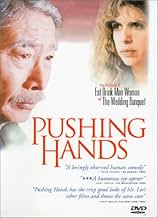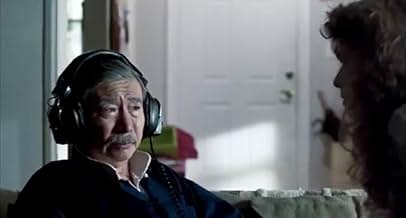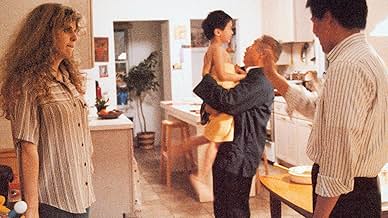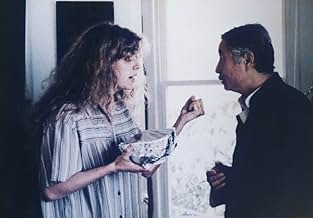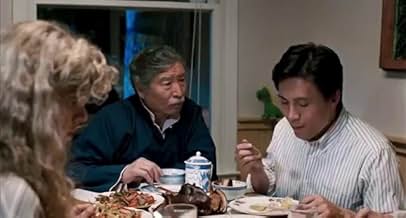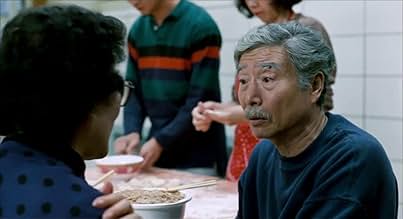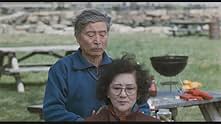VALUTAZIONE IMDb
7,2/10
5155
LA TUA VALUTAZIONE
Aggiungi una trama nella tua linguaAll the while, Master Chu tries to find his place in the foreign American world.All the while, Master Chu tries to find his place in the foreign American world.All the while, Master Chu tries to find his place in the foreign American world.
- Regia
- Sceneggiatura
- Star
- Premi
- 6 vittorie e 7 candidature totali
Bozhao Wang
- Alex Chu
- (as Ye-tong Wang)
Recensioni in evidenza
The adage of "Great things come in small packages" aptly applies to PUSHING HANDS/TUI SHOU. The film deftly tells its story with charm, humor and grace. A son's elderly father is the newest part of the family, and troubles therein lie. Essentially, it's a story of one family, yet could easily fit into many households. So many topics are breached, under the gentle, loving eye of the director (Ang Lee). The leads, the venerable Sihung Lung, Deb Snyder and Bo Z. Wang, do a credible job bringing this story to life. Recommended.
Ang Lee's first feature film, compared to "Eat Drink Man Woman," is a bit too neat and plain, but it still possesses the characteristic traits of Lee's later films - quiet and plain, yet captivating. It's truly miraculous that if this son were placed in another director's film, he would undoubtedly be detested, yet under Lee's direction, he evokes a sense of weakness without crossing into detestable territory. "The sun is shining, and I just want to stand here for a while. After all, no one is waiting for me. I'll forget about it after standing here for a while." This reminds me of my grandmother, who moved from her hometown to the city and struggled to adapt. Two weeks later, she insisted on going back. During most of the daytime, she would just sit on the balcony, soaking up the sun. I wonder what she was thinking at that time. Initially, I thought it was about cultural barriers, but later I realized it was much sadder. Cultural barriers can be temporarily overlooked through the efforts of both sides, but time and aging are forces that cannot be resisted.
When I was in class that day, I asked the students what did the "pushing hand" say? Almost all of them, including those who haven't seen "Pushing Hands", answer the collision between Chinese and Western cultures, so I wonder why it is so unified. After reading Baidu Encyclopedia, I understand! What is the "homesickness" is indeed the standard of the central idea, but there is no performance in the movie, and it is not allowed to pay for the payment.
Inserting a digression, about the very interesting thing about this film, on the day of the release of "Pusher", the box office was flat. On the same day, I won nine nominations at the Golden Horse Award, and after winning the best actor, supporting actress and special prize, the box office immediately after the next day. Big rise. It seems that we have to hear about it, only to know it. After reading the comments, we know what the movie is about?
"Pushing Hands" Virgo is often the most like the author himself, so "Pushing Hands" is very good, and the sharp parts are hidden under the gentle and popular narrative.
The whole film is staring at Lao Zhu alone, so look at "Pushing Hands" and see Lao Zhu.
Taijiquan Professor Zhuo-Taiji Pusher, in the words of Lao Zhu in the film, is: We practice the inner family, pay attention to refining the spirit, practicing the spirit, and waiting for the level of refining the spirit, it is very It's hard to practice again.
Lao Zhu is an old man who admits to lose.
I practiced pushing my hand to teach Lao Zhu at this level, but I feel that life has become utterly weak.
The loneliness and emptiness faced after retirement were all due to the reason that the son came to the United States, and the son married the wife of the foreign woman. All the pressure was passed on to his son and he could see it in the next minute.
So Lao Zhu did not accept his life and wanted to fight.
Teaching Tai Chi in Chinatown, the action after meeting Chinese Mrs. Chen is completely like a boy in first love.
Later, after the hope was shattered, Lao Zhu still refused to admit defeat and left home!
This "jailbreak" failed again. In the face of the humiliation of the restaurant owner, Lao Zhu's bloody Fang's defeat of the "enemy" still lost his cultivation.
10Matador
Pushing Hands is Ang Lee's beautiful film about an elderly Chinese man transplanted into his son's American home. While most films about this subject, which for some reason critics like to call "East meets West", hyperbolize the struggles that immigrant Chinese must face, Pushing Hands tends to focus on minutia instead. For example, the elderly grandfather does not know that tin foil cannot be put into the microwave, which leads to a scolding by his caucasian daughter-in-law. All the conflict in the film is grounded in the real world, as opposed to some very abstract 'generational conflict'. Because of this I found this film to be much more rewarding than most other films about Asian-Americans. A must-see for Chinese-Americans and Caucasians alike. Personally, I'd like to watch it with my Chinese grandparents.
Listen for James Schamus's cameo as the voice on the answering machine at the beginning of the film.
Listen for James Schamus's cameo as the voice on the answering machine at the beginning of the film.
Sihung Lung, the actor who played Master Chu, the aging tai chi master, gave a very convincing and sincere performance in this film. It was no wonder that he won the Golden Horse (Taiwan's equivalent for the Oscars) for Best Actor in this film. His performance was extremely touching, as tears jerked into my eyes as I see an aging and traditional Chinese father trying to get along with his westernized family while also trying to adjust to life in a new place and culture. The film encourages people, especially new immigrants, to emphasize and put themselves in their parents' shoes. Try to understand how difficult it is for them to come and settle in a new place and try not to push them away. Be patient with them, take a step back and everything may be better.
The movie title, "Pushing Hands", is very appropriate, as this is the term for an exercise in tai chi in which a person achieves balance by giving up balance. In this non-aggressive exercise between 2 people, a person offers no resistance at all to the pressure or push that the other person is exerting and keeps borrowing this strength until they feel they have fused into one and thus have achieved harmony. This was what Master Chu did. Although his daughter-in-law kept misunderstanding him, causing much discontent and eventually got his son to try to sent him away, he offered no resentment or a temper tantrum. He simply walked away gracefully. This action caused his son to appreciate him and remember why he got his father to live together in the first place in a tear jerking scene and finally they worked out a solution. They decided to give each other space by living separately instead of pushing each other away. In the end everyone was much happier, as even the daughter-in-law learned to accept the father, symbolized by her decorating the guest room for him and asking the question if he would ever visit. The father achieved the balance that he seek in Tai-Chi.
Ang Li is simply amazing and sensational. He did what he could with the limited budget and created a very warm and tear jerking film. Although this film was not the highest quality (the version I saw was very unclear and skips sometimes) and it could feel slow at times, especially the beginning sequence, the film was a great work in directing. The film picked up its pace after the slow beginning without any big fighting scenes or explosions and never felt boring afterwards. Also, from the beginning sequence, where he was able to show the dissension and gap between the daughter-in-law and the father by using just different scenes and visuals, to scenes throughout the film where he used lighting and different camera angles to show the internal pain and sadness that the father experience, it was, simply put, a great piece of art considering the budget. It showcased the talent of Li and gave the audience a glimpse of the man who would bring us the memorable Couching Tiger, Hidden Dragon.
The movie title, "Pushing Hands", is very appropriate, as this is the term for an exercise in tai chi in which a person achieves balance by giving up balance. In this non-aggressive exercise between 2 people, a person offers no resistance at all to the pressure or push that the other person is exerting and keeps borrowing this strength until they feel they have fused into one and thus have achieved harmony. This was what Master Chu did. Although his daughter-in-law kept misunderstanding him, causing much discontent and eventually got his son to try to sent him away, he offered no resentment or a temper tantrum. He simply walked away gracefully. This action caused his son to appreciate him and remember why he got his father to live together in the first place in a tear jerking scene and finally they worked out a solution. They decided to give each other space by living separately instead of pushing each other away. In the end everyone was much happier, as even the daughter-in-law learned to accept the father, symbolized by her decorating the guest room for him and asking the question if he would ever visit. The father achieved the balance that he seek in Tai-Chi.
Ang Li is simply amazing and sensational. He did what he could with the limited budget and created a very warm and tear jerking film. Although this film was not the highest quality (the version I saw was very unclear and skips sometimes) and it could feel slow at times, especially the beginning sequence, the film was a great work in directing. The film picked up its pace after the slow beginning without any big fighting scenes or explosions and never felt boring afterwards. Also, from the beginning sequence, where he was able to show the dissension and gap between the daughter-in-law and the father by using just different scenes and visuals, to scenes throughout the film where he used lighting and different camera angles to show the internal pain and sadness that the father experience, it was, simply put, a great piece of art considering the budget. It showcased the talent of Li and gave the audience a glimpse of the man who would bring us the memorable Couching Tiger, Hidden Dragon.
Lo sapevi?
- BlooperThe son, Alex, has physiognomy that is unmistakably that of someone Beijing, and the actor speaks with a Beijing accent, but the father, who demonstrates Taiwanese cultural practices, has the appearance of someone from farther south, such as near Shanghai. Regardless of whom the father might have married, the couple could not have produced a child with such Northern characteristics. This is a casting error more than a character error.
- ConnessioniFeatured in Century of Cinema: Naamsaang-neuiseung (1996)
I più visti
Accedi per valutare e creare un elenco di titoli salvati per ottenere consigli personalizzati
- How long is Pushing Hands?Powered by Alexa
Dettagli
- Data di uscita
- Paesi di origine
- Lingue
- Celebre anche come
- Pushing Hands
- Luoghi delle riprese
- Aziende produttrici
- Vedi altri crediti dell’azienda su IMDbPro
Botteghino
- Budget
- 400.000 USD (previsto)
- Lordo Stati Uniti e Canada
- 152.322 USD
- Fine settimana di apertura Stati Uniti e Canada
- 9567 USD
- 4 giu 1995
- Lordo in tutto il mondo
- 152.322 USD
Contribuisci a questa pagina
Suggerisci una modifica o aggiungi i contenuti mancanti


